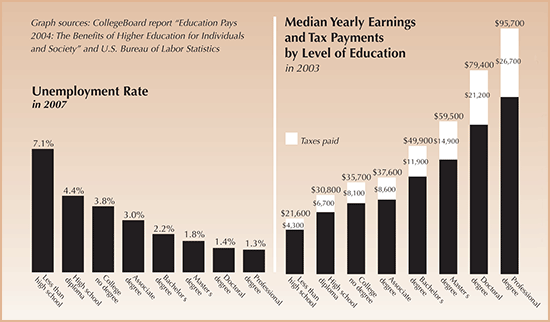The Myth of the Ivory Tower
“If you think about what doctoral students are trained to do, they learn how to do research, they learn how to think critically, they learn how to pose specific, important questions and then get an answer to those questions. Those are characteristics of leaders, not just people who are in the professoriate.”
It is an unfortunate stereotype: Graduate students waste several years on impractical research in libraries and labs only to enter the academy and train others to do the same. The myth of the ivory tower is that academics are locked away from real world issues and seldom have a meaningful impact outside of the university's walls.
Debra Stewart and the Council of Graduate Schools are working to change that perception by exposing the facts about how graduate education in the U.S. benefits local communities, states, the nation and even the world. In 2008, the council published a report, “Graduate Education and the Public Good,” which details how the impact of graduate education reaches far beyond academia. During course work graduate students are often already devoted to solving society's most important problems, and after receiving their degrees they become the leaders, innovators and highly skilled professionals in areas such as public policy, education, nursing, public health, engineering, social work and information technologies. In fact, more than 70 percent of doctoral degree holders work outside of academia.
- At UNC-Chapel Hill, $610.7 million in research grants generated approximately $1.04 billion in economic impact and 20,000 jobs for the state's economy in 2008.
- Carolina disclosed 121 inventions, issued 60 new patents and created $2.8 million in license revenue in 2008.
- Graduate degrees increase employability and wage-earning potential. According to the Bureau of Labor Statistics, one-sixth of the fastest growing occupations through 2016 will require an advanced degree.
- 92.5% of those with advanced degrees rate their health as good, very good or excellent.
- Advanced degree holders rarely require public assistance.
The men and women who earn their graduate degrees contribute to the economy because of their analytical skills and innovative ideas. The result is farreaching economic impact including new start-up companies, the creation of good jobs and higher revenues for the state. They also become leaders in their fields and their communities, enriching the quality of life far beyond the towers of the University.

Graph sources: CollegeBoard report “Education Pays 2004: The Benefits of Higher Education for Individuals and Society” and U.S. Bureau of Labor Statistics
Sources: UNC-CH Office of Sponsored Research and “Graduate Education and the Public Good”
• Jeremy Cramer and Luca Semprini


